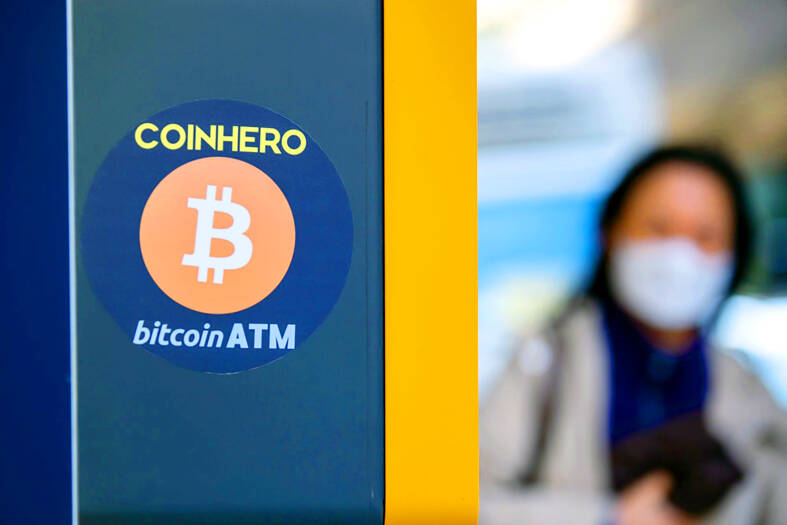Money managers who have avoided the many ups and downs of cryptocurrencies might be feeling relieved for having done so, a senior investment strategist at JPMorgan Asset Management said.
“As an asset class, crypto is effectively nonexistent for most large institutional investors,” Jared Gross, head of institutional portfolio strategy at the company, said on last week’s episode of Bloomberg’s What Goes Up podcast.
“The volatility is too high, the lack of an intrinsic return that you can point to makes it very challenging,” he said.

Photo: Paul Yeung, Bloomberg
In the past, there used to be some hope that bitcoin could be a form of digital gold or haven asset that could provide inflation protection, but it is “self-evident” that has not really happened, Gross said.
“Most institutional investors probably are breathing a sigh of relief that they didn’t jump into that market and are probably not going to be doing so anytime soon,” he said.
Cryptocurrency prices rallied in 2020 and last year, boosted in part by a number of traditional finance players getting into the space or at least voicing support for it.
That was an important development for cryptocurrency enthusiasts, who saw that type of embrace as giving credence to the nascent industry, but digital assets have suffered mightily this year as the US Federal Reserve and other major central banks have raised interest rates to fight inflation.
FALLING PRICES
Such a less-accommodative environment has been deleterious to cryptocurrency.
Bitcoin, the largest token, has shed 60 percent of its value this year and ether has tumbled about 70 percent.
Meanwhile, the decades-long trend of globalization has come to an end and the fracturing of geopolitics would have huge implications for capital markets and investing next year, Gross said on the podcast, which also discussed how everything from supply chains to industrial policy, energy and defense would feel the impact from globalization’s demise.

GROWING OWINGS: While Luxembourg and China swapped the top three spots, the US continued to be the largest exposure for Taiwan for the 41st consecutive quarter The US remained the largest debtor nation to Taiwan’s banking sector for the 41st consecutive quarter at the end of September, after local banks’ exposure to the US market rose more than 2 percent from three months earlier, the central bank said. Exposure to the US increased to US$198.896 billion, up US$4.026 billion, or 2.07 percent, from US$194.87 billion in the previous quarter, data released by the central bank showed on Friday. Of the increase, about US$1.4 billion came from banks’ investments in securitized products and interbank loans in the US, while another US$2.6 billion stemmed from trust assets, including mutual funds,

Micron Memory Taiwan Co (台灣美光), a subsidiary of US memorychip maker Micron Technology Inc, has been granted a NT$4.7 billion (US$149.5 million) subsidy under the Ministry of Economic Affairs A+ Corporate Innovation and R&D Enhancement program, the ministry said yesterday. The US memorychip maker’s program aims to back the development of high-performance and high-bandwidth memory chips with a total budget of NT$11.75 billion, the ministry said. Aside from the government funding, Micron is to inject the remaining investment of NT$7.06 billion as the company applied to participate the government’s Global Innovation Partnership Program to deepen technology cooperation, a ministry official told the

Taiwan Semiconductor Manufacturing Co (TSMC, 台積電), the world’s leading advanced chipmaker, officially began volume production of its 2-nanometer chips in the fourth quarter of this year, according to a recent update on the company’s Web site. The low-key announcement confirms that TSMC, the go-to chipmaker for artificial intelligence (AI) hardware providers Nvidia Corp and iPhone maker Apple Inc, met its original roadmap for the next-generation technology. Production is currently centered at Fab 22 in Kaohsiung, utilizing the company’s first-generation nanosheet transistor technology. The new architecture achieves “full-node strides in performance and power consumption,” TSMC said. The company described the 2nm process as

Even as the US is embarked on a bitter rivalry with China over the deployment of artificial intelligence (AI), Chinese technology is quietly making inroads into the US market. Despite considerable geopolitical tensions, Chinese open-source AI models are winning over a growing number of programmers and companies in the US. These are different from the closed generative AI models that have become household names — ChatGPT-maker OpenAI or Google’s Gemini — whose inner workings are fiercely protected. In contrast, “open” models offered by many Chinese rivals, from Alibaba (阿里巴巴) to DeepSeek (深度求索), allow programmers to customize parts of the software to suit their